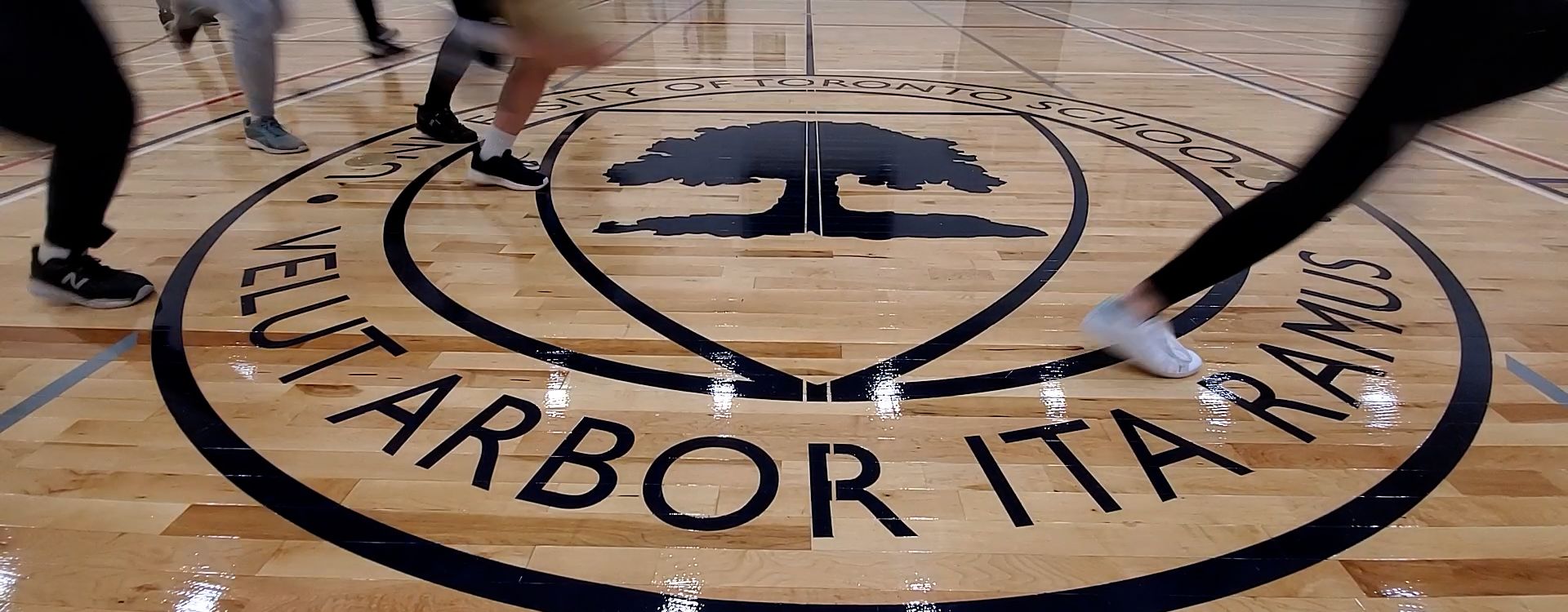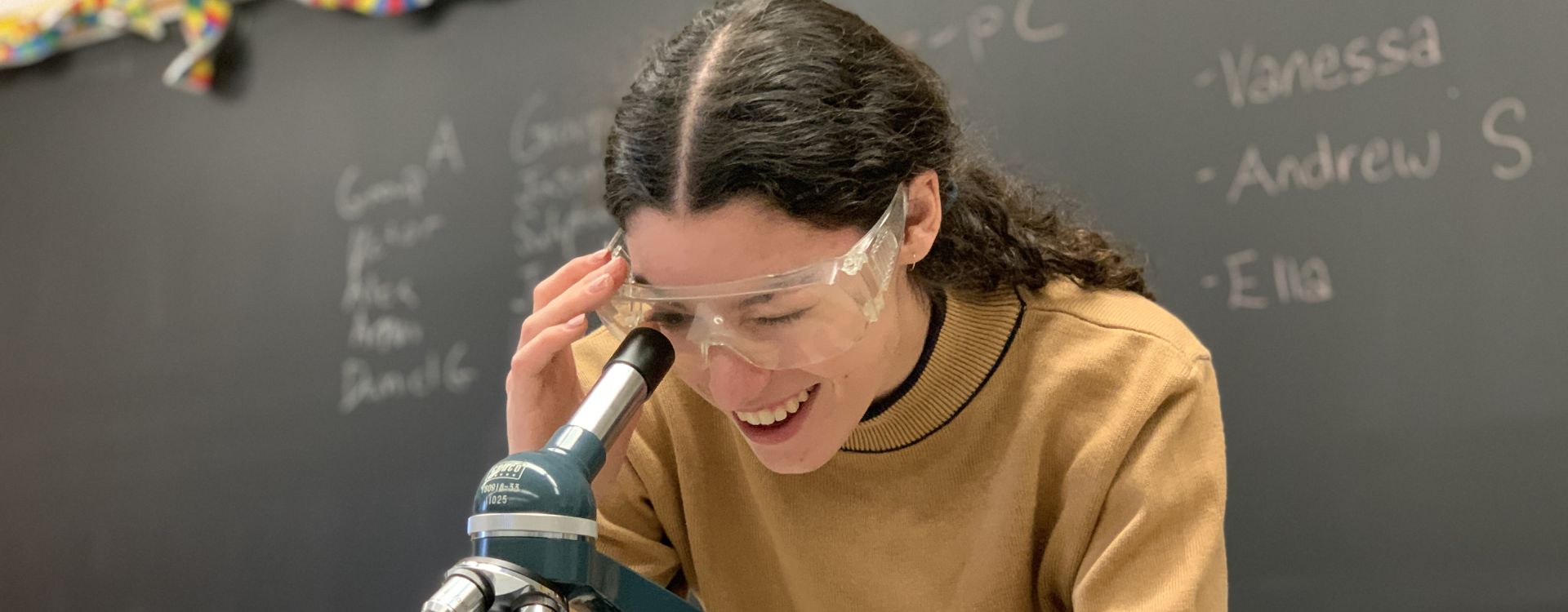371 Bloor Street West
Toronto, ON M5S 2R7 get directions
Toronto, ON M5S 2R7 get directions



A UTS education is transformative. Our school is a hub where the boldest and brightest young minds – from across the Greater Toronto Area and beyond – come together. Rigorous academics are the foundation, but the learning goes much deeper.
Every day, students are emboldened among a community of like-minded peers. They are welcomed with a culture committed to inclusion. They learn from exceptional educators. They benefit from our affiliation with the University of Toronto, our stunning, modern building on the U of T campus, and access to U of T libraries and athletics facilities.
Our new home is the school that dreams are made of, bringing the curriculum to life. At the heart is a communal gathering place, the sky-lit Fleck Atrium. The Lang Innovation Lab gives students the space and tools they need to bring their great ideas to life. Students learn in state-of-the-art science labs and purpose-build music and art rooms. The 700-seat Withrow Auditorium allows the entire community to gather together and gives student performers the opportunity to experience a professional stage. The Jackman Theatre allows students to workshop in an authentic studio theatre environment. The McIntyre Gymnasium provides a double gym, complemented by the Ridley Centre for fitness.
We believe in education for the whole person. UTS sets the academic bar high with impressive results. An extraordinary breadth and depth of course options are available, including exceptional STEM opportunities.
Academics are complemented by vibrant co-curriculars where students explore interests as diverse as robotics, entrepreneurship, mathematics, performing arts and more. They become leaders in their own right, champions of causes, and organizers of major events such as Southern Ontario Model United Nations and the Girls in Technology Conference. An equally robust Athletics Program features more than 30 competitive sports teams, plus plenty of opportunities for fun.
The UTS curriculum evolves with the world around us. Curriculum renewal is ongoing as we deepen our culture of inclusion. There is no one story, but many. We continue to widen our scope to embrace underrepresented narratives and groups across the board. Learning themes for younger students focus on Truth and Reconciliation, and Sustainability, grounding them on the most pressing issues of our times.
The synergies of exceptional students, extraordinary educators, and the University of Toronto connection converge. Students come to UTS as engaged young people with big ideas. They graduate as empowered leaders and champions of change with the means to have an impact on our world.
When you're studying a second language, the culture is so intertwined. As students study a second language at UTS, they gain the benefit of developing new perspectives.
Jennifer Kelly, Languages Department Coordinator and French Teacher
Science at UTS is about going beyond the recipe and taking those risks that lead to progress.
Jenny Pitt-Lainsbury, Head of Student Support and Student Innovation
The offerings of Canadian and World Studies at UTS provide students with a multifaceted perspective of our known world, through a distinctly human lens.
The Arts – Music, Drama and Visual Art – is an integral part of the UTS curriculum. At UTS all students take three arts courses in their F1 (Grade 7) year, developing creative and critical thinking skills, as well as vital forms of communication.
| The Arts at UTS | |
|---|---|
| Drama | All Drama courses explore creative problem-solving through collaboration and experiential learning. In the Foundation years, students explore basic drama skills, processes and styles through workshops, rehearsal, and performance. From then on, students expand and deepen their knowledge of theatre and film, and move towards independently creating, directing, producing and presenting their own works. |
| Music | Throughout the six-year program at UTS, students engage in musical performance, creation and analysis. The study of Music is intended to develop students’ understanding and appreciation through a focus on practical skill development and creative work. Students gain creative problem-solving skills, individual and collaborative work habits, knowledge of themselves and others, a sense of personal responsibility, connections to their communities and future careers. |
| Visual Arts | The Visual Arts program encourages discovery, independence and self-awareness through the study of studio workshops, historical analyses and contemporary art practices. Each year, students will build and diversify their collection of works within an individualized portfolio. |
| Interdisciplinary Art and Design | Our world is increasingly interconnected and interdependent. We are facing an unprecedented range of issues that cannot be truly understood in isolation. Contemporary understandings and solutions are achieved by bridging between distinct academic disciplines and categories of knowledge. This course examines how artists, designers, cultural theorists and others construct “quality connections” through the use of interdisciplinary methods and perspectives. To become effective global citizens and change-makers we must use interdisciplinary lenses: to conduct inquiry with depth and breadth; to synthesize acquired knowledge; and then design with empathy for the user to communicate new understandings. |
UTS calls upon students to become socially responsible, equity-oriented global citizens. Social responsibility and global citizenship lie at the heart of the Canadian and World Studies curriculum. We reflect on our shared past, seek to understand the present, and grapple with the increasingly complex global challenges that confront us. In Canadian and World Studies courses, students develop the skills, knowledge, and attitudes they need to become informed, innovative and engaged citizens, with the means to have an impact on the world at large.
There is no one viewpoint, and no one story, but a multitude. We embrace courageous curiosity, seeking solutions for a better world.
In our study of literature and language at UTS, the principal objective is the development of an inquiring and perceptive mind. Clarity, depth, and creativity in oral and written expression are valued. Through reading, speaking, listening, writing, and the exploration of various media, students will be encouraged to reflect upon the nature of the human experience.
Our greatest focus is to help students make positive connections with healthy active living that last for life. That's why Health and Physical Education curriculum is core to the UTS curriculum, required for all students from Grade 7 to 11.
Students hone their prowess and leadership skills in our new McIntyre Gymnasium, a double gymnasium, and work on their fitness in the adjacent Ridley Centre. Facilities also include gender-neutral changerooms. The UTS Affiliation with University of Toronto gives students access to athletics facilities on the U of T campus, including Robert Street Field, Varsity Stadium, Back Campus Field and swimming pools.
UTS Athletics offers co-curricular opportunities for students to strive for excellence in many sports or just have fun, from playing at the intramural level to competing in a provincial OFSAA championship.
At UTS, Health and Physical Education is ultimately about empowerment. Our school’s commitment to physical and mental health earned the OPHEA Healthy Schools certification for the third year in a row. We provide education for the whole person, so students become resilient in mind and body.
| Core Elements of Health and Physical Education at UTS | |
|---|---|
| Living Skills | Students establish positive relationship skills, positive self-concept and resilience. The Foundation program is grounded in mental health, digital citizenship and other important health issues, while our Middle and Senior students explore other health skills like self-management, interpersonal communication and managing goals for healthy active living. UTS cares deeply about the overall wellbeing of our students. Empowerment is core to our Strategic Plan, which includes fostering relationships and belonging, cultivating student leadership and supporting mental health and wellness. |
| Physical Literacy | Health and Physical Education classes enhance physical literacy by helping students become more confident, competent and enthusiastic about being physically active. The program ranges from sports like basketball, soccer, handball, football, floorball, ultimate, badminton, squash and table tennis, to movement-based activities like dance, mobility flows and yoga. |
| Active Living | The program fosters habits for active living and healthy habits that can last a lifetime. |
| Health Literacy | The health curriculum enhances students' understanding of factors that contribute to healthy development and instills a sense of personal responsibility for lifelong health and wellbeing. It covers mental health, healthy eating, sexual health, substance use, addictions and related behaviours and personal safety and injury prevention. We also focus on the seven essential health skills common to health and wellbeing: analyzing influences on our health, accessing valid and reliable health resources, self-management of healthy habits, goal setting for good health, decision-making for health, self-advocacy and advocacy for others’ health, interpersonal communication for health and wellbeing. |
The robust global languages program at UTS enables students to study multiple languages, participate in language competitions and international exchanges, take proficiency tests, go on exchange trips to live and study abroad, and even earn official bilingual certification.
| Languages offered at UTS | |
|---|---|
| French - Core and Special | Required in Grades 7 to 9, available until Grade 12 |
| German | Available from Grades 9 to 12 |
| Latin | Required in Grade 8, available until Grade 11 |
| Mandarin | Available in Grades 9 to 12 |
| Spanish | Available from Grade 9 to 12 |
Student take their learning beyond the classroom. Co-curricular opportunities abound for students looking to deepen their understanding and enjoyment of language, from the Classics Conference to the multi-lingual student publication Écho, Eco, Echo, and language clubs to practice language fluency and explore international cultures.
UTS Math and Computer Science courses bring students to a deeper understanding of the fundamental techniques on which to build their knowledge. We meet students at their level to expand their mathematical horizons and practice real-world applications in areas like finance, statistics, digital recognition and more.
At UTS, our Science classes encourage students to take risks, make mistakes, learn from them and let curiosity guide their way to new discoveries.
Students have countless opportunities to deepen their understanding of science with co-curricular activities, including Let’s Talk Science, Robotics Club, Sci-Club, Physics Club, Canadian Young Physicists' Tournament, Neuroscience Club, Dissection Club, Hemoglobal, Envirothon, Brain Bee and the annual Girls in Technology Conference, organized by UTS girls for Grade 6 to 8 girls in Ontario.